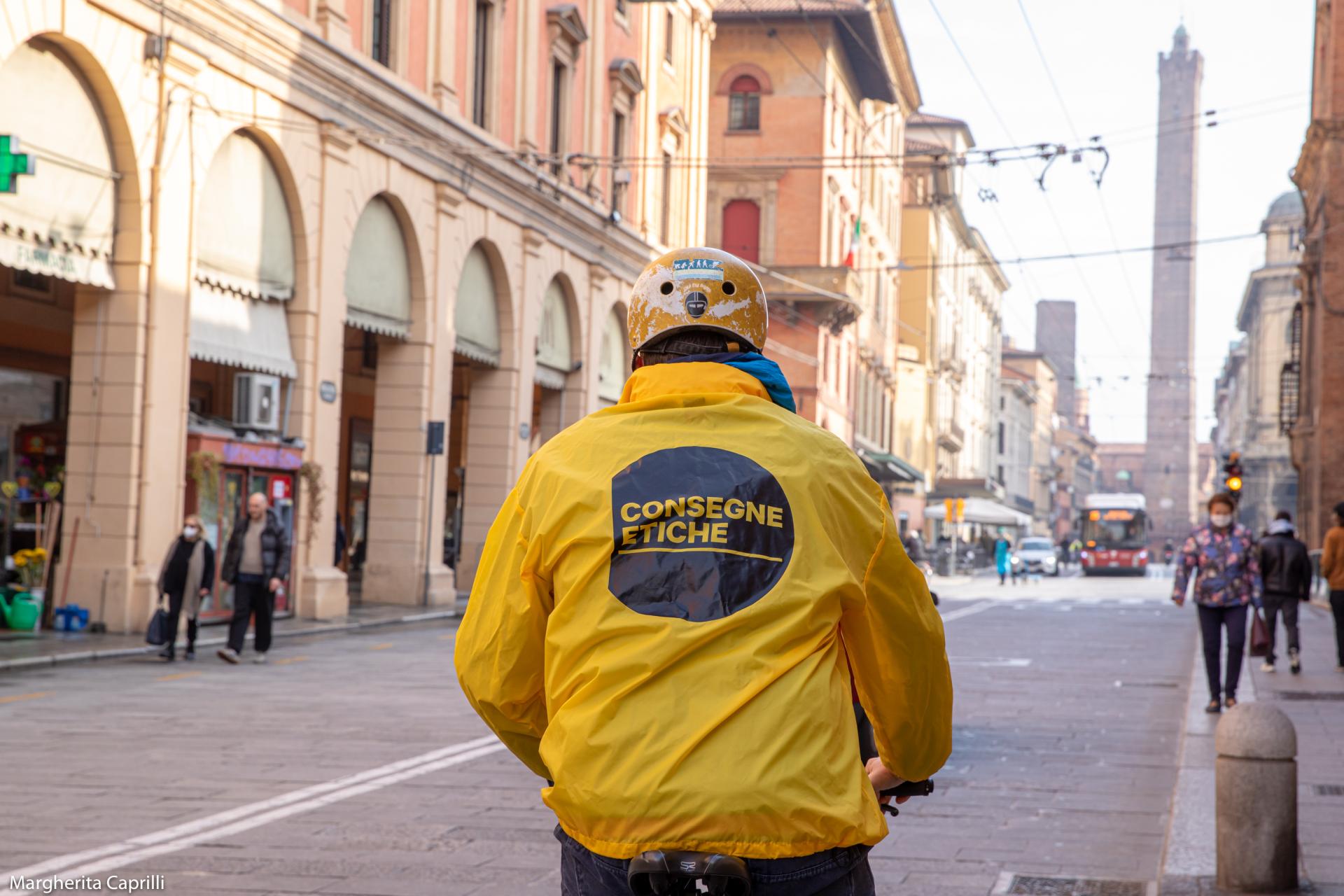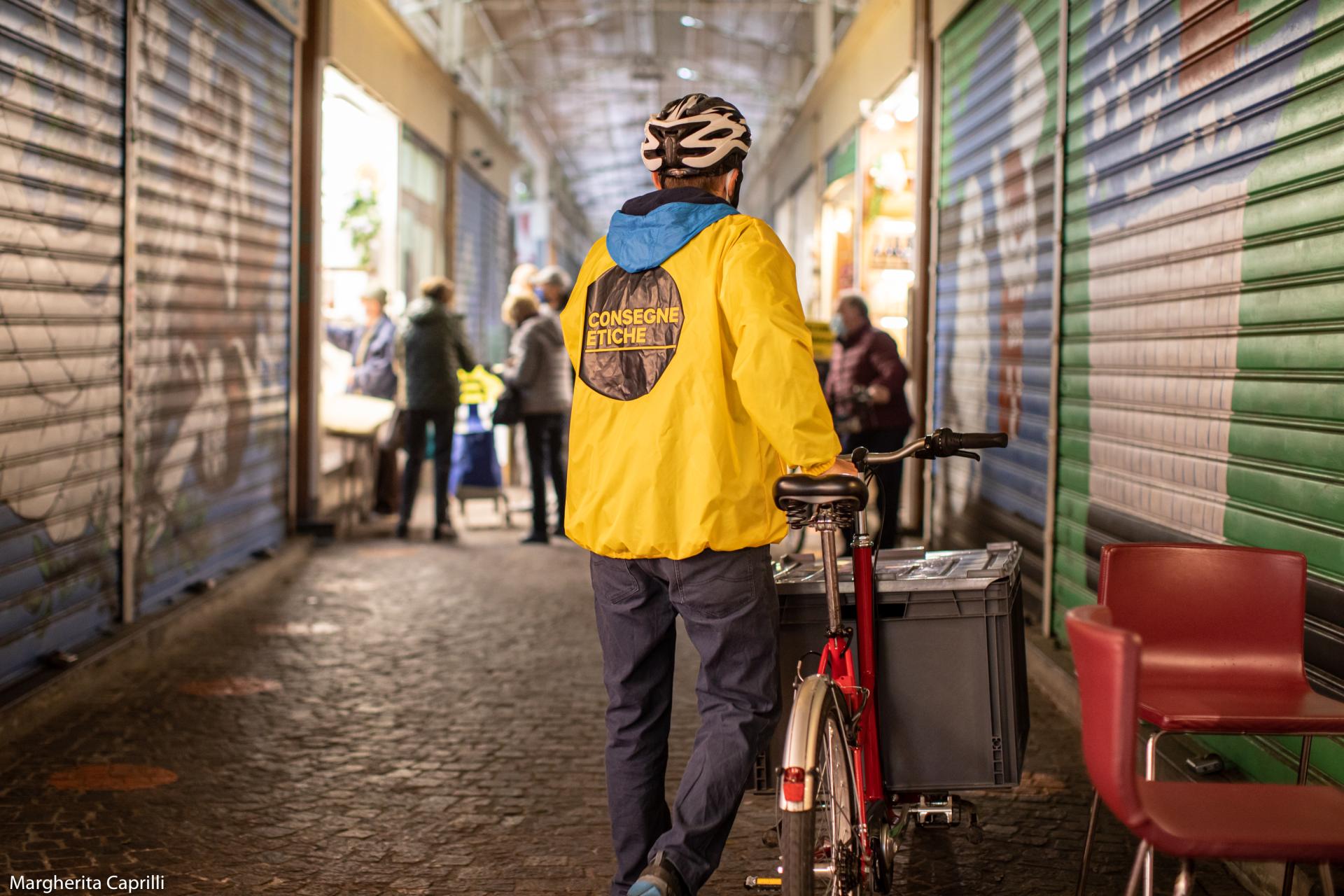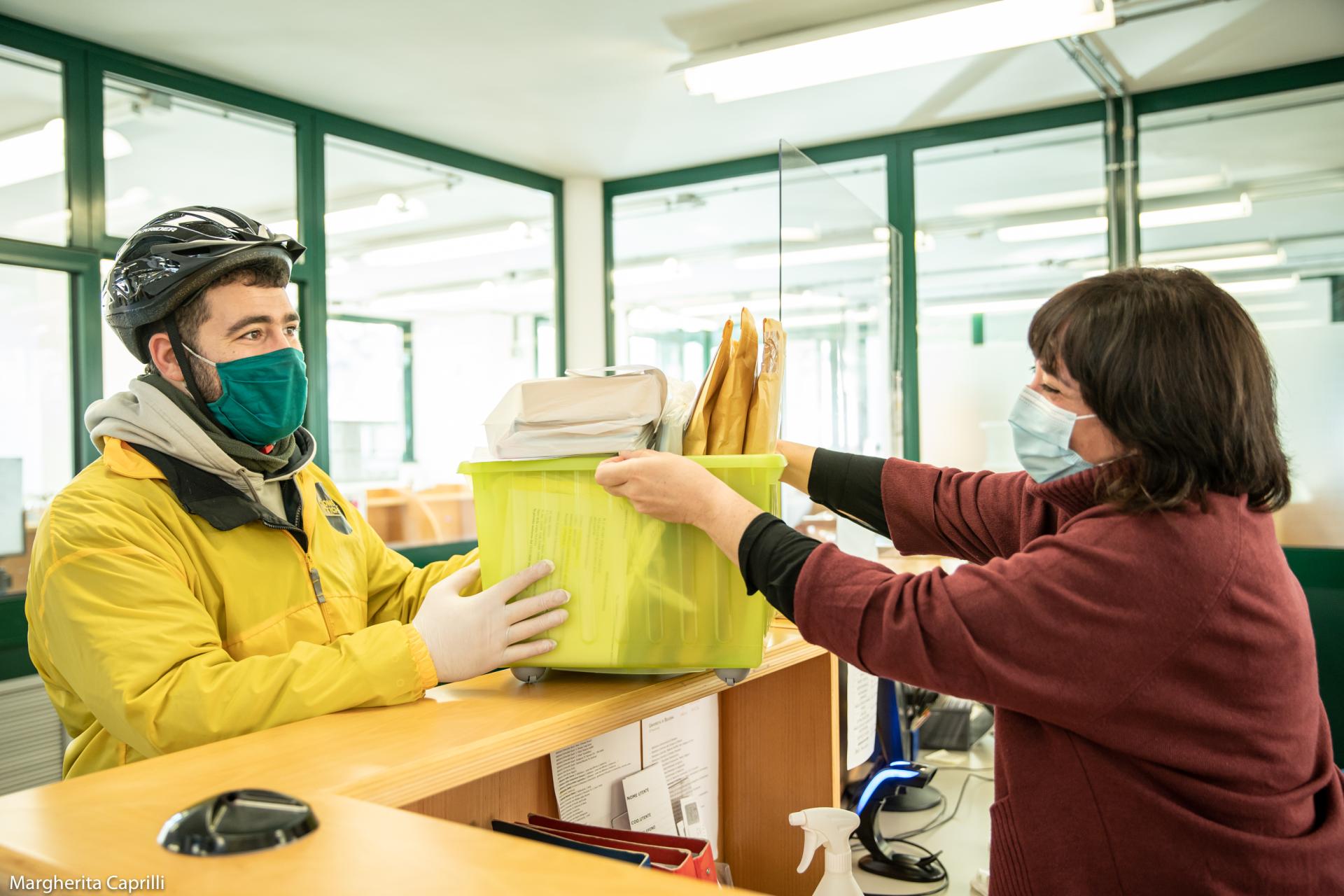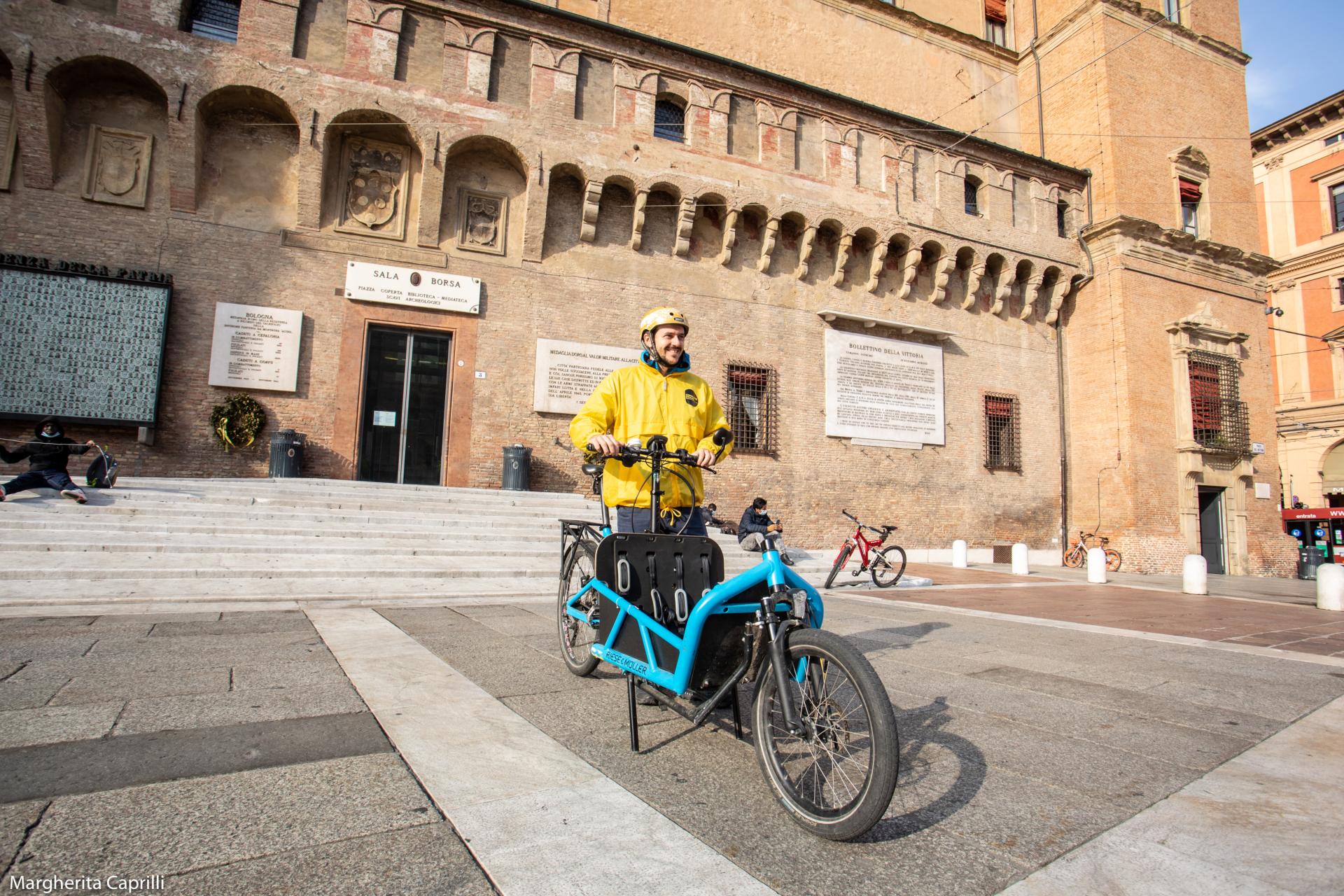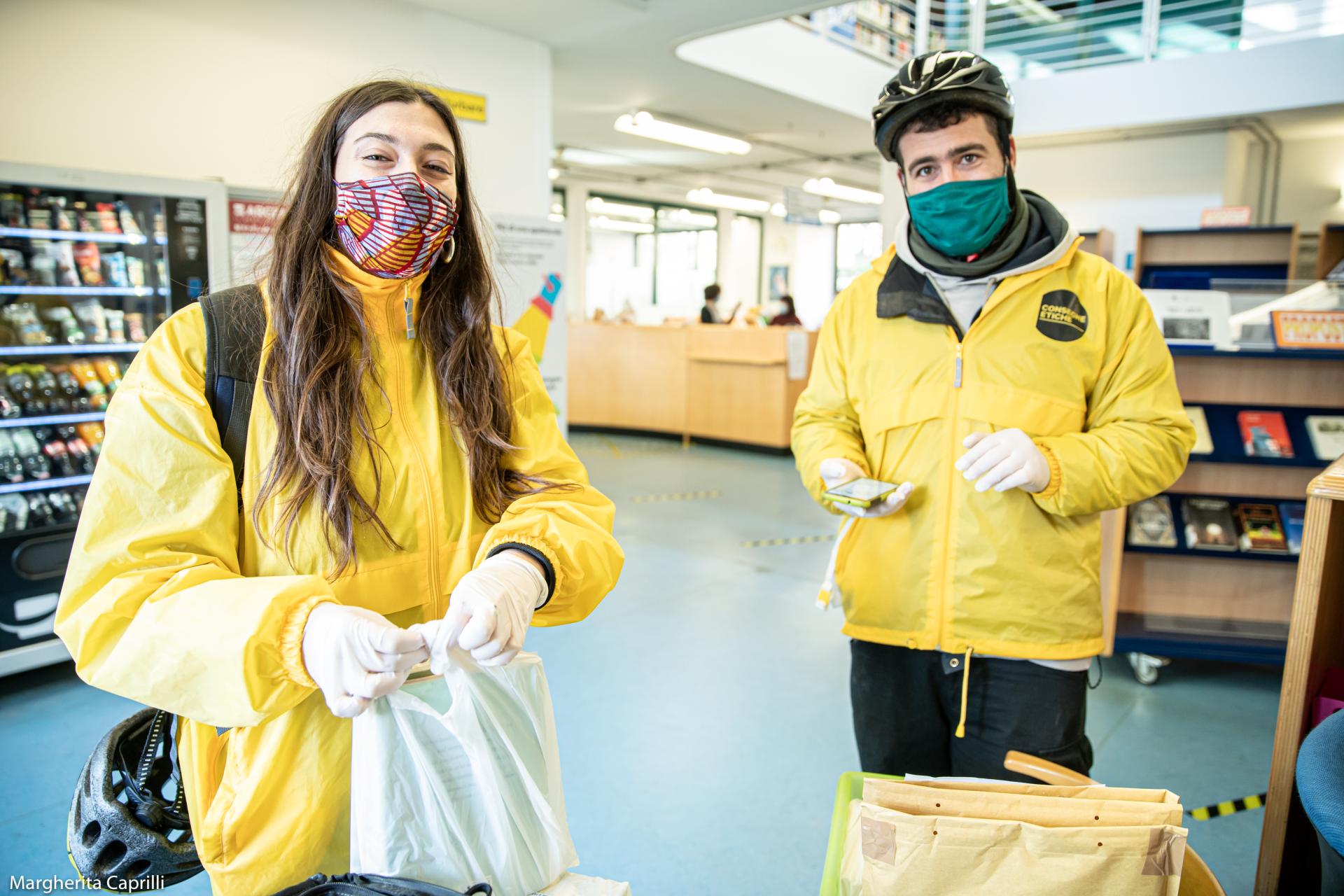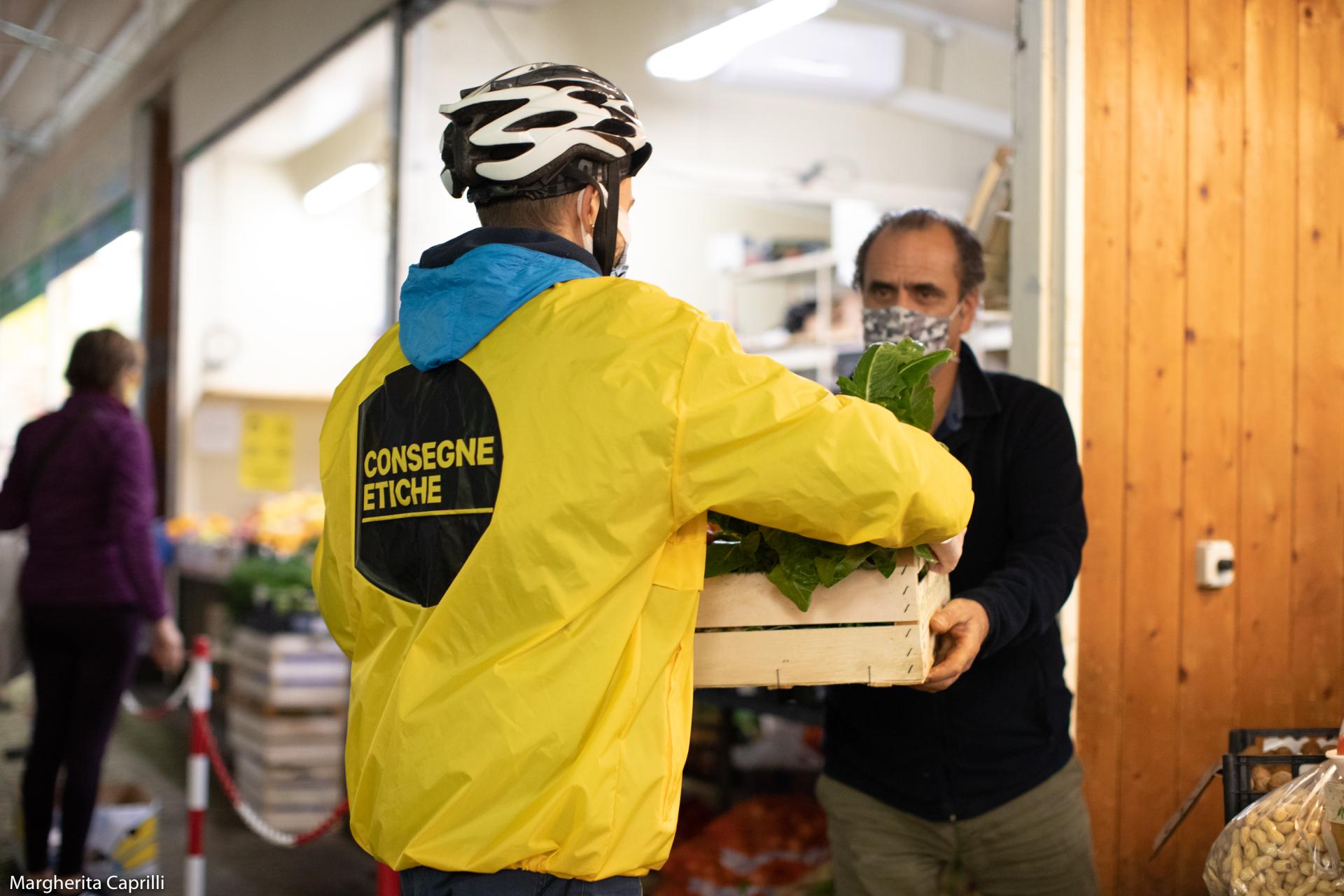Ethical Deliveries Experimentation
Basic information
Project Title
Full project title
Category
Project Description
The pandemic has highlighted the need to prototype a collective and supportive response to the increasing demand for home delivery services. Facing this urgency, the Foundation started a project aimed at co-designing an ethical alternative to overcome the model of platform capitalism. This resulted in the creation of a new cooperative governance structure of platforms and a local network enabling a socially and environmentally sustainable provision of both groceries and book lending to citizens.
Project Region
EU Programme or fund
Description of the project
Summary
The project was launched through an online public assembly in April 2020, bringing together academics of platform cooperativism, the riders’ union of Bologna, and local retailers to face the emerging challenges related to an increase in home delivery services due to the pandemic.
Both quantitative and qualitative means were used during a research phase that involved the main actors in the field (delivery people, retailers, trade associations, riders’ union…) through interviews, benchmarking actions, and in-depth analysis of needs which allowed the Foundation to understand which actions are put into place, and investigate the possible criticalities and visions on the part of the local communities. This resulted in a common vision, the Manifesto: an index of reference values to frame essential approaches for the development of an alternative solution that can concretely give more value to the delivery service by guaranteeing rights and protections to the worker and by enhancing proximity relationships within the community. These guidelines were written in compliance with the provisions of the Charter of Fundamental Rights for Digital Work in the Urban Context of Bologna. Together with the local delivery cooperatives Dynamo and Idee in Movimento, the Foundation was able to actualize the values defined by the Manifesto through a co-design process and the establishment of an initial core of the local network of stakeholders. The alternative service was firstly tested between May 22 and June 14, 2020, during which Dynamo and Idee in Movimento delivered about 1700 protective masks produced by a local company.
By September 2020, the website consegnetiche.it was launched during the European Sustainable Mobility Week, officially initiating the project experimentation phase.
Between October and December, 2020 citizens could order their groceries, borrow books from the municipal libraries, and purchase goods from individual neighborhood traders.
Key objectives for sustainability
The Ethical Deliveries service has been designed to face two main challenges in terms of sustainability: safeguarding workers’ from social inequalities and reducing the environmental impact of home delivery service systems, related to the great increase in demand for these services due to the pandemic.
Having regard to social sustainability objectives, the project was started to face the exploitative conditions that make the work of the riders discriminatory on a legal and remunerative basis. The outsourcing of service established by the capitalist platform model frequently prevents this community from having equal rights and legal protection compared to other working categories. In agreement with the Riders' Union of Bologna, the Ethical Deliveries experimentation was established to promote a fair delivery price to value the riders work as well as a set of services for the community to use, according to the needs revealed during the research phase and in compliance with the provisions of the Charter of Fundamental Rights for Digital Work guaranteeing the legal representation of this community of practice.
The alternative model of home delivery service co-designed by the Foundation, the Municipality of Bologna, and two local delivery cooperatives aimed at promoting bicycle deliveries, reducing CO2 emissions and supporting small traders selling local products to enhance the 0-km trade and to value proximity relations within the community. Environmental sustainability objectives were met by reducing the number of deliveries made by high-consumption vehicles, selecting local associations and traders with a clear code of ethics in terms of environmental impact as partners, and activating an awareness-raising campaign concerning consumption habits of citizens.
Efficiency was guaranteed in accordance with the timing and the efforts of the bicycle trips by dividing the city into zones and calculating the number of deliveries per hour together with the riders.
Key objectives for aesthetics and quality
In order to ensure both the attractiveness and tangibility of the service in the eyes of the end consumers, the Foundation has put into place two key actions: the design of a new coordinated image for the service and ongoing widespread storytelling of the project. However, diverse and unforeseen objectives in terms of aesthetics and quality of experience emerged thanks to the round tables, the research and needs analysis phase as well as to the relations undertaken with small local traders. By bringing together the various perspectives of involved parties, it was understood how important it would have been to design a service capable of giving citizens back a city free from van traffic and of valuing relationships even in small daily gestures.
The great increase in demand for home delivery services due to the pandemic has rapidly led to the filling up of the city streets with vans and vehicles parked alongside parks, public spaces, and homes. As Dynamo's operators pointed out, this has not only led to an increase in CO2 consumption but is also damaging the livability and attractiveness of the city of Bologna both for citizens and for tourists. Thus, by offering a bicycle-only delivery service the Ethical Delivery model is not only meeting key objectives in terms of sustainability but is also trying to restore and enhance the aesthetic value of the city.
The desire to restore dignity and quality to local riders’ and local traders’ work has also provided the basis for enhancing the experiential value of a small daily gesture such as home deliveries.
The urge of this need was clearly brought to light during the prolonged experience of lockdown and social isolation related to the emergency situation. For this reason, the Ethical Deliveries service was designed to value proximity - by building a local network and an open governance structure- as well as to give back to riders the time to weave relationships with their customers and ask for their feedback.
Key objectives for inclusion
Inclusion and accessibility were achieved both on the demand and supply sides.
The Ethical Deliveries service was designed in response to the emergency situation due to the pandemic, and in particular to face two related problems: the urgency tackled by small traders to set up new home delivery services finding themselves forced to refer to a single and expensive active system, and the increasing needs of people in a condition of domestic isolation, experiencing difficulties in terms of mobility, not autonomous and/or alone.
On one hand, the alternative aimed at making accessible the possibility of providing a home service at a fair price for all parties involved, enabling the re-opening of smaller activities. To achieve this objective the participation fee paid to the cooperatives coordinating the deliveries was kept lower enough to enable traders to access the service and let them decide how much of this should have been passed on to the final price. In addition, the co-design phase focused on creating a website encompassing all communication channels normally used by traders with their network of regular customers (phone numbers, WhatsappBusiness, eCommerce…). The desire to give value to local services keeping the relationship between traders and citizens alive was emphasized through the Manifesto, which states as well the willingness to avoid those mechanisms that fuel competition and systematically rules out the market actors with fewer resources.
On the other hand, the participation of neighborhood libraries has laid the foundations for meeting the cultural needs of those who have difficulty in accessing some basic city services beyond the restrictions due to the pandemic. One of the key points raised during the round tables was the importance of creating a system to support city solidarity processes. In this sense, the ethical service was designed to give the necessary time back to riders for them to meet and listen to consumers' needs.
Results in relation to category
The research and confrontation phase resulted in 15 interviews with local actors and the drafting of the Manifesto, as a set of guidelines for future action. The characteristics that allow the realization of an ethical alternative for home delivery services were made clear in compliance with the provisions of the Charter of Fundamental Rights for Digital Work in the Urban Context of Bologna.
As a result of the co-design phase the website consegnetiche.it was created. By September 2020 the first partnerships with local stakeholders were established. In particular two supermarkets Coop 3.0, two shops NaturaSì, two local markets (Mercato Albani and Via Vittorio Veneto), and three restaurants adhered to the initiative. Nine libraries took part in the project as well to expand their service of book lending. Numerous requests for membership from riders currently working on mining platforms were received during the implementation of the experimentation phase. By the end of the project, a temporary association of purpose was set up to give continuity to the initiative.
Moreover, in order to inform the public and give voice to those involved in the project, the Foundation promoted the video-making of a documentary, tracing step-by-step the design of the platform and the implementation of the service. This production was selected by the Sardinian association Società Umanitaria to be part of the film festival dedicated to the problems faced by workers due to the pandemic. Since December 2020, the local success of this initiative has brought to light the urgency of confronting these issues at a national level as well. Thus, the Ethical Deliveries experimentation, and the other Italian municipalities’ willingness of replicating the experimentation, has opened up the discussion and supported the setting up of a government table on the status and legal rights of precarious workers.
How Citizens benefit
The Ethical Delivery service was started as part of the wider project Ri-innovare la città- Osservatorio, a space for thematic and territorial analysis of the challenges faced by the citizens of Bologna during the pandemic. The latter was created to draw up indications of priorities and actions needed to counteract the economic and social effects of the crisis by seizing opportunities for the future of the city.
Both citizens and intermediate bodies, associations, and networks operating in the urban area were asked to raise the main issues deriving from the emergency situation due to the pandemic and related challenges. Collecting data on the concrete needs of different communities was the first step to bring out the voice of a greater number of local traders and end-users.
Meetings dedicated to volunteers and members of project partner associations (Union Riders, Antoniano Onlus, Cucine Popolari..) were organized to define the logistic details of the foreseen activity. Moreover, several training events were developed as a public moment of involvement and community building for the local riders. Within Dynamo offices, a permanent space was created to encourage exchange and communication between all the parties involved. Being open and free of charge 24 hours a week, this space was conceived as a reference point for those approaching the initiative for the first time as well as a standpoint provided with several services for the riders to use for waiting between deliveries.
Major institutions were engaged as well, both benefiting and affecting the development of the platform experimentation. The Municipal Department for Public Libraries was involved both as a facilitator supporting the project through an effective official communication campaign and as a partner benefiting from the initiative. Thanks to the work of the delivery cooperatives, nine municipal libraries met the new needs of their users by activating the library loan service directly at home.
Innovative character
The innovative nature of the project can be traced to two key elements: the willingness to test new forms of cooperative governance and the research-based mobilization of different stakeholders as a tool for a rapid co-design of new services.
The Ethical Deliveries service was started to prototype and test elements of economic and managerial sustainability promoting an innovative form of ethical competition. The project aimed at setting up the first sustainable community cooperative, rejecting the outsourcing, and designing an extended governance mechanism including riders, sustainable logistics cooperatives, sensitized traders, and end-users. The governance structure was thought as open, on the basis of subscription to the Manifesto.
Starting from a situation of poor protection due to a failure in recognizing the rider as an employee of the company a more stable form of contract was developed. This gives the possibility to riders to work on a preset number of shifts and avoids the algorithm system used to distribute deliveries between laborers. The first experimentation led to the foundation of a multi-stakeholder temporary association, whose main actors are the cooperative Idee in Movimento and the association Salva i Ciclisti, while Dynamo is the key partner for the actual implementation of the service.
The achieved results were made possible by a research-based mobilization of different stakeholders as a starting point for the project. The experimentation represented a great opportunity to experiment with the implementation of a participatory process for the co-design of a new service. The Foundation was able to transfer practices for civic imagination usually aimed at participatory urban planning to structure a concrete alternative for the marketplace. Political, territorial, and citizens' interests were brought together through thematic tables and made it possible to collect existing experiences in the area putting them into a system.

